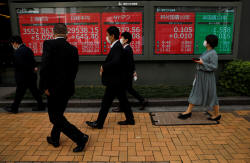European stocks gain ahead of earnings; China adds stimulus
 Send a link to a friend
Send a link to a friend
 [January 17, 2022] By
Elizabeth Howcroft [January 17, 2022] By
Elizabeth Howcroft
LONDON (Reuters) - European shares were
slightly higher in early trading on Monday as investors focused on
company earnings and U.S. Federal Reserve policymakers entered a quiet
period ahead of their meeting next week.
Stock market moves in Asian trading were small and economic data from
China was mixed: industrial output picking up but retail sales missed
expectations.
China's central bank unexpectedly eased policy by cutting rates on
medium-term loans.
Analysts expect more policy easing as growth in the world's
second-largest economy has shown signs of slowing from its rapid rebound
after the COVID-19 slump.
At 0856 GMT, the MSCI world equity index, which tracks shares in 50
countries, was up 0.1%. Europe's STOXX 600 was up 0.5%. U.S. markets are
closed on Monday for a public holiday.
Expectations of central banks tightening policy to combat persistent
inflation have meant that equities have generally struggled to make
gains so far this year and investors are rotating from growth to value
stocks.
Investors are focused on company earnings, which will need to be strong
to prevent further losses. Goldman Sachs, BofA, Morgan Stanley and
Netflix report earnings this week.

Marija Veitmane, senior multi-asset strategist at State Street Global
Markets, said that she would be looking to see how much the costs of
higher prices and labour shortages have affected corporate profits, as
well as how companies will spend the money on their balance sheets.
"One thing that was a very positive surprise for us last year,
particularly towards the end of the year, was the strength of corporate
margins," Veitmane added. "Corporates were able to pass higher costs to
the end consumer and that was really encouraging news for us. That's
exactly what we'll be looking for this time around."
FED MEETING
The U.S. Federal Reserve meets on Jan. 25-26 and investors expect a
cycle of rate hikes to begin in March. Rate hikes tend to harm riskier
assets such as equities.
[to top of second column] |

Passersby wearing protective face masks walk past an electronic
board displaying world stock indexes, amid the coronavirus disease
(COVID-19) pandemic, in Tokyo, Japan November 1, 2021. REUTERS/Issei
Kato

Speculators' net bearish bets on benchmark U.S. 10-year Treasury note futures
have swelled to their largest since February 2020, just before the onset of the
pandemic, according to Commodity Futures Trading Commission data released on
Friday.
The yield on the 10-year U.S. Treasury yield hit a two-year high last week. The
implied yield from futures rose to 1.85% early on Monday.
"Inflation is high, markets expect central banks to be much more aggressive and
interest rates going higher, but what we're seeing is that the yield curve is
not steepening," State Street's Veitmane said.
"What that means to me is that markets expect the hiking cycle to start faster
but to be quite shallow, and I think that's really key for equity markets."
At 0916 GMT, the U.S. dollar index was down 0.1% on the day at 95.075, clinging
to its recent bounce. The euro was at $1.1432.
Ahead of a Bank of Japan policy meeting concluding on Tuesday, the dollar was up
0.2% against the yen, at 114.435.
Euro zone government bond yields edged higher, with the benchmark German 10-year
yield at -0.034%.
Brent crude futures hit their highest in more than three years as investors bet
supply will remain tight amid restrained output by major producers, with global
demand unperturbed by the Omicron coronavirus variant.
Bitcoin was a touch lower, around $42,850.
(Reporting by Elizabeth Howcroft; Editing by Pravin Char)
[© 2022 Thomson Reuters. All rights
reserved.]This material may not be published,
broadcast, rewritten or redistributed.
Thompson Reuters is solely responsible for this content.
 |